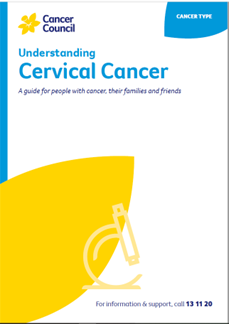- Home
- Cervical cancer
- Diagnosis
- Your health care team
Your health care team
Your GP will arrange the first tests to assess your symptoms. If these tests do not rule out cancer, you will usually be referred to a specialist, who will arrange further tests.
If cervical cancer is diagnosed, the specialist will consider treatment options. Often these will be discussed with other health professionals at what is known as a multidisciplinary team (MDT) meeting. During and after treatment, you will see a range of health professionals who specialise in different aspects of your care.
To find cancer specialists, multidisciplinary teams and hospitals in NSW or ACT, you can visit the NSW Government website CanRefer.
Health professionals you may see
| gynaecologist | specialises in diseases of the female reproductive system; may diagnose cervical cancer and then refer you to a gynaecological oncologist |
| gynaecological oncologist | specialises in cancers of the female reproductive system; diagnoses and performs surgery for these cancers, including cervical cancer |
| radiation oncologist | treats cancer by prescribing and overseeing a course of radiation therapy |
| medical oncologist | treats cancer with drug therapies such as chemotherapy and targeted therapy |
| radiologist | analyses x-rays and scans; an interventional radiologist may also perform a biopsy under ultrasound or CT guidance, and deliver some treatments |
| radiation therapist | plans and delivers radiation therapy |
| cancer care coordinator | coordinates your care, liaises with MDT members, and supports you and your family throughout treatment; care may also be coordinated by a clinical nurse consultant (CNC) or clinical nurse specialist (CNS) |
| nurse or nurse practitioner | administers drugs and provides care, information and support throughout treatment; a nurse practitioner works in an advanced nursing role and may prescribe some medicines and tests |
| dietitian | helps with nutrition concerns and recommends changes to diet during treatment and recovery |
| social worker, psychologist | link you to support services; help with emotional and practical problems associated with cancer and treatment |
| women’s health physiotherapist | treats physical problems associated with treatment for gynaecological cancers and lymphoedema |
→ READ MORE: Treatment for cervical cancer
Podcast: Coping with a Cancer Diagnosis
Listen to more of our podcast for people affected by cancer
More resources
Prof Martin Oehler, Director of Gynaecological Oncology, Royal Adelaide Hospital, and Clinical Professor, University of Adelaide, SA; Dawn Bedwell, 13 11 20 Consultant, Cancer Council QLD; Gemma Busuttil, Radiation Therapist, Crown Princess Mary Cancer Centre, Westmead Hospital, NSW; Dr Antonia Jones, Gynaecological Oncologist, The Royal Women’s Hospital and Mercy Hospital for Women, VIC; Angela Keating, Senior Psychologist, Royal Hospital for Women, NSW; Anne Mellon, Clinical Nurse Consultant – Gynaecological Oncology, Hunter New England Centre for Gynaecological Cancer, NSW; Dr Inger Olesen, Medical Oncologist, Andrew Love Cancer Centre, Barwon Health, Geelong, VIC; Dr Serena Sia, Radiation Oncologist, Fiona Stanley Hospital and King Edward Memorial Hospital, WA; A/Prof Megan Smith, Co-lead, Cervical Cancer and HPV Stream, The Daffodil Centre, Cancer Council NSW and The University of Sydney, NSW; Emily Stevens, Gynaecology Oncology Nurse Coordinator, Southern Adelaide Local Health Network, Flinders Medical Centre, SA; Melissa Whalen, Consumer.
View the Cancer Council NSW editorial policy.
View all publications or call 13 11 20 for free printed copies.



